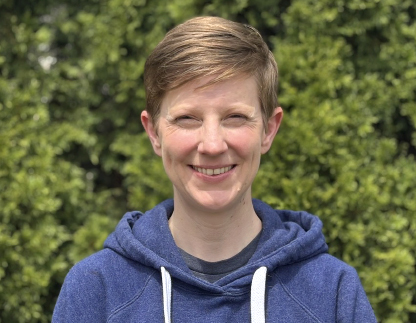A single conversation can open doors and help you see what's possible.”
Jenny Bartloff
Postdoctoral Fellow in the Shirley Ryan Ability Lab

Jenny Bartloff is a postdoctoral fellow at Shirley Ryan Ability Lab and the Feinberg School of Medicine. Her research focuses on developing technology to improve walking for people with neurologic conditions. (You can watch a short video about the new shoe technology she is currently researching here.) Jenny is a recipient of the T32 Enhancing Translational Science to Accelerate Impact of New Innovations (E-TRAIN) Postdoctoral Fellowship.
How would you describe your research and/or work to a non-academic audience?
Neurologic conditions such as stroke, Parkinson’s disease, and MS affect millions of people in the U.S., and often cause significant walking impairments. If you’ve ever needed to use crutches because of an injury, you know how much a walking problem complicates your day-to-day life: getting into a car or using public transportation becomes tricky, even getting to the bathroom takes more time. Everything takes more effort and is more tiring.
Imagine if that walking problem never went away. This is reality for individuals dealing with walking problems due to neurologic problems. How would that impact your quality of life and the things you choose to do?
My research aims to help people with neurologic disabilities to regain and improve their mobility. I blend my clinical experience as a neuro PT with my training in mechanical engineering to develop better treatments to restore walking ability, independence, and quality of life. Some of this work involves designing or testing new technologies, and some involves developing a better understanding of how the brain controls walking.
What have been some of the most memorable twists and turns of your career?
Returning to grad school in a new field after having been in the clinic for about 10 years was a huge change. I took several undergraduate engineering courses in my first two years, and it was humbling to be in class with students half my age.
Tell us what inspired your research and/or work.
I started my career as a physical therapist, where I specialized in helping people who have neurologic conditions like stroke, Parkinson's disease, and Multiple Sclerosis. Working with people who were navigating the daily realities of life with neurologic impairments was rewarding, and it also helped me see firsthand the strengths of rehab medicine and the challenges our field must overcome to help patients reach their full potential.
I chose to go back to grad school and study mechanical engineering to gain skills and expertise in developing new technology to support clinical innovations for improving walking and balance.
What do you find both rewarding and challenging about your research and/or work?
In the clinic, 1:1 relationships allow for a personalized approach. But in the research lab, we step back from the individual to look for ways to improve care at the group level. This shift is necessary, but means letting go of some of the flexibility we have in clinical practice. It demands that we frame our research questions carefully, account for clinical and practical realities from the start, scrutinize each data point, and approach our study design with creativity. As a clinician, it’s rewarding to make a direct impact to help someone walk more safely or return to activities that matter to them. In the lab, the reward is in advancing knowledge, building tools, and improving systems that can benefit many.
What books are on your bedside table?
Slow Productivity by Cal Newport. It’s helping me think more intentionally about doing fewer things in order to focus on quality. I’m also rereading The Wild Trees by Richard Preston, which is about people who climb into the canopies of the tallest trees in the world. The story is so good, it reads like fiction, part science and part adventure.
What did you originally want to be when you grew up?
I wanted to be a scientist! I loved biology and thought I would do something in that field, with ideas of anything from zoology to oncology. In college, I joined a biology research lab, but I was disappointed when I realized the day-to-day work wasn’t a great fit for my interests. After that, I was matched with a mentor in a cognitive science lab, whose enthusiasm for her field was contagious. Her generosity and support helped me to feel like I belonged in research. When I decided on becoming a PT, I loved that it was a science-driven career where I could help people directly. I knew that eventually, I’d return to research and use my clinical experience to bridge the gap between science and practice.
What advice would you give your younger self or someone considering a similar path?
If you're curious about something in science, start looking for people who do that kind of work. Explore university websites, especially ones near where you live or might attend, and don’t be afraid to reach out to researchers/professors. Find their email and send a short message asking for advice on how to get started or if they’d be willing to chat for a few minutes. Most scientists are excited to talk about the work they love, especially with someone who shares that interest.
A single conversation can open doors and help you see what's possible. Don’t wait to be invited—start the conversation. And if you don’t get a great vibe from the first person you reach out to, don’t get discouraged, just keep looking. The right mentor can make all the difference.
Are you the recipient of a Northwestern University Fellowship? If so, please list them below.
T32 Enhancing Translational Science to Accelerate Impact of New Innovations (E-TRAIN) Postdoctoral Fellowship
Publish Date: September 9, 2025